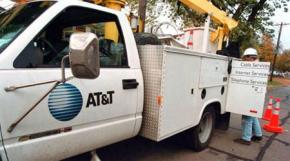Will there be a strike at AT&T?
reports on what's at stake in the CWA's battle for a new contract at AT&T.
CONTRACTS COVERING about 100,000 workers at AT&T expired at midnight on April 4, but members of the Communications Workers of America (CWA) are continuing to report to work while negotiators remain at the table.
Employment security, health care and benefits for retirees are the main issues that have yet to be resolved, according to the CWA. "The CWA bargaining teams are very frustrated by AT&T's slow pace in negotiations," said Annie Hill, an executive vice president of the union. "Instead of working toward quality settlements that will benefit workers and the company, AT&T negotiators chose to drag out negotiations without a plan for settlement."
Despite raking in $12.9 billion in profits last year, AT&T is pushing for significant concessions from union workers. The health care concessions sought by the company would amount to a 7 to 10 percent pay cut if implemented, according to the CWA.
The business press is watching the contract fight at AT&T avidly to see if a company that is still profitable can impose the same kind of concessions that other companies harder hit by the recession are getting away with.

The CWA has been preparing members for a possible job action for months, setting up a strike fund and calling on workers to prepare financially for a work stoppage. CWA members have also launched a work-to-rule campaign to put pressure on management.
AT&T is preparing to use scabs in the event of a strike. It has contracted with agencies to have workers on call, and is training management to do the jobs of union workers.
Across the country, but especially in the Northeast, groups of CWA workers have held rallies and marches to demonstrate their resolve to management. In New Haven, Conn., 2,500 AT&T workers marched through the streets with signs that read, "Taking a stand against corporate greed" and "No contract, no peace."
AT&T is an official sponsor of the NCAA college basketball tournament, and if a strike is called before the April 6 championship game, thousands of CWA members plan to demonstrate outside the Detroit arena where the game will take place.
Though AT&T has enjoyed a good performance despite the economic downturn, the company is seeking to use the crisis facing GM and Chrysler as a way to intimidate workers into taking the concessions.
Currently, AT&T workers must pay about 8 percent of the cost of their health care plans--which is more than any worker should pay, but less than the national average of 34 percent.
AT&T spokesperson Marty Richter told the Akron Beacon Journal that "the benefits the current union employees get are roughly the same as union employees with GM and Chrysler." Richter's comment was a thinly veiled threat that AT&T would likewise face bankruptcy if workers don't take concessions.
But CWA workers aren't buying it. Nearly 90 percent of members voted to authorize a strike, giving union negotiators a strong hand at the bargaining table. The last time the five contracts covering various regions where these workers are employed were negotiated, workers held a four-day strike.
Last year, CWA workers at Verizon faced a similar dispute with management, which wanted to end Verizon's obligation to pay employees' insurance premiums in full. The final contract held the line on health care for active and retired workers, but mandated that new hires would pay for post-employment health care according to a "defined contribution formula."
If CWA workers do strike AT&T, they will need active support. A national strike at AT&T would be a high-profile stand for health care and other benefits in a climate of recession and union givebacks. We need the CWA to come away with a victory for our side.


